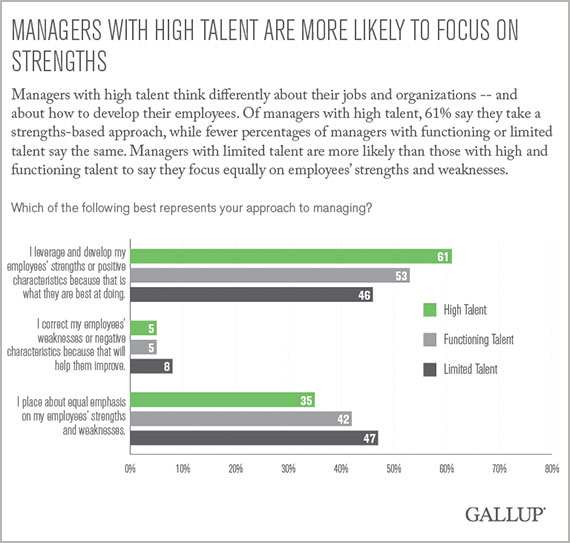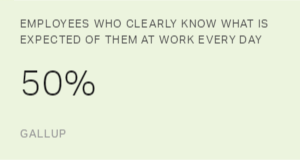Story Highlights
- Talent is the natural capacity for excellence
- Managers with high talent are better brand ambassadors
- Managers with high talent are more likely to focus on strengths
One of the most important decisions companies make is simply whom they name manager, Gallup has found. Yet our analytics suggest they usually get it wrong: Companies fail to choose the candidate with the right talent for the job 82% of the time.
And great managers are scarce because the talent required to be one is rare. Gallup's research shows that about one in 10 people possess high talent to manage. Though many people have some of the necessary traits, few have the unique combination of talent needed to help a team achieve the kind of excellence that significantly improves a company's performance. When these 10% are put in manager roles, they naturally engage team members and customers, retain top performers and sustain a culture of high productivity.
Defining Talent
Gallup's latest report, State of the American Manager: Analytics and Advice for Leaders, provides an in-depth look at what characterizes great managers and examines the crucial links between talent, engagement and vital business outcomes such as profitability and productivity. Gallup research shows that when people use their talents they can learn a role faster and adapt to variance in the role more quickly. These individuals not only produce more, but they also produce at a higher quality. Gallup also has found powerful links between top talent and crucial business outcomes, including higher productivity, sales, and profitability, lower turnover and fewer unscheduled absences.
Gallup defines talent as the natural capacity for excellence. People can learn skills, develop knowledge and gain experience, but they can't acquire talent -- it's innate. When individuals have the right talent for their role, they're energized by their work, rarely thinking of it as "work" at all. For others whose talent is not the best fit, the same work can feel draining. Talent is the stabilizer: It paves the way for consistently excellent performance.
Gallup has studied the behavior of high performers in every imaginable role, from elite military personnel and teachers to bank tellers and truck drivers. With every role studied, Gallup has found one unwavering truth: Successful people have similar talents. And managers are certainly no exception.
Gallup describes manager talent using five "talent dimensions":
- Motivator
- Assertiveness
- Accountability
- Relationships
- Decision-Making
Gallup determined that the five dimensions of manager talent are the greatest predictors of performance across different industries and types of manager roles (such as general manager, field manager and team manager). An individual who exhibits the five dimensions to a high degree has what Gallup calls "high" manager talent. An individual who has many of the talents necessary to be a successful manager but needs support has "functioning" talent. An individual who lacks talent across the five dimensions has "limited" talent and is much less likely to be a successful manager regardless of the support he or she receives.

Manager Talent and Performance
An organization's level of talent directly affects its bottom line. Gallup's research reveals strong correlations between talent and business outcomes such as profitability, sales and productivity. When Gallup examined manager talent, we discovered even more evidence linking this vital element to organizational performance:
- Managers with high talent are twice as likely to be engaged. In a study of 2,551 managers, Gallup found that 54% of managers with high talent are engaged at work -- twice the percentage of managers with limited talent. This finding has significant implications for organizations that find themselves struggling to break out of mediocrity. Gallup has studied engagement since the 1990s and repeatedly discovered that companies with high levels of engagement outperform others on business outcomes. If organizations can find and hire more managers with high talent, they can likely raise their overall levels of engagement and performance.
- Managers with high talent are better brand ambassadors. Typically, organizations hold managers responsible for helping employees understand the brand promise and know how to deliver it. But if managers don't know what sets their company apart, there is little chance their employees do. Organizations that hire managers based on talent are more likely to have a strong and effective army of brand ambassadors who understand and live the brand, and who can more successfully engage customers.
- Managers with high talent are more likely to focus on strengths. Managers with high talent think differently about their jobs and organizations, and they think differently about how to develop their employees. When Gallup asked managers to choose the option that best represented their management approach, 61% of managers with high talent say they take a strengths-based approach, while fewer percentages of managers with functioning or limited talent say the same. Managers with limited talent are more likely than those with high and functioning talent to say they focus equally on employees' strengths and weaknesses.

When employees know and use their strengths, they are more engaged, have higher performance and are less likely to leave their company. In a Gallup study of 1,003 randomly selected U.S. employees, nearly two-thirds (61%) of employees who felt they had a supervisor who focused on their strengths or positive characteristics were engaged -- twice the average (30%) of U.S. workers who are engaged nationwide. A manager's approach to strengths has a profound impact on engagement, and that engagement has a profound impact on just about everything that matters to an organization's long-term viability.

